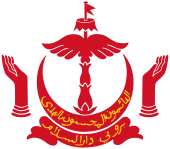| Brunei Nationality Act | |
|---|---|
 | |
| Cabinet of Brunei | |
| |
| Citation | [1] |
| Enacted by | Government of Brunei |
| Enacted | 1 January 1962 |
| Amended by | |
| |
| Status: Amended | |
The Bruneian nationality law governs the issues of citizenship and nationality of Brunei. The law regulates the nationality and citizenship status of all people who live in Brunei as well as all people who are of Bruneian descent. It allows the children of expatriates, foreigners as well as residents in Brunei to examine their citizenship status and if necessary, apply for and obtain citizenship of Brunei.
Contents
- Citizenship
- Nationality law of 1962
- Jus sanguinis
- Naturalization
- Registration
- Dual Citizenship
- Benefits
- References
The primary law relating to Bruneian citizenship is the Nationality Act, 1962 drafted while Brunei was a British protectorate. The act was later amended in 1984 and 2002.
Bruneian citizens are also Commonwealth citizens as well.